- charleston@wildlifeanimalcontrol.com
Call 24/7 for a free quote:
843-325-2666
Charleston Wildlife Animal Control
Professional Wildlife Removal Company Servicing Charleston, SC
If you have a problem with wildlife in your Charleston home, your best option is to hire a company that specializes in South Carolina wildlife removal only. This is a specialty business, and regular pest control companies do not use the proper techniques to solve animal problems. I have spent many years reviewing South Carolina and Charleston, and I recommend the following:
TruTech Wildlife Service
Cell Phone: 843-325-2666
NOTE: If you have a dog or cat problem, call Charleston County Animal Services: (843) 554-4700

TruTech Wildlife Service specializes primarily in removing animals from attics of homes and buildings - this includes squirrels in attics, raccoons, and rats or mice in homes. South Carolina also has a documented problem with
bats in buildings, and TruTech Wildlife Service is specially trained in bat removal. They also perform general wildlife trapping services, such as the capture and removal of skunks or opossums on the
property. Call 843-325-2666 to discuss your critter problem and schedule a same-day or next-day appointment. Click here to learn more about
what prices we charge in 2022.
When hiring a company to solve your wild animal problem, you want these features:
- Specializes in wildlife removal, not pest control
- Fully South Carolina and Charleston County licensed and insured
- Works 7 days per week (critters don't take weekends off)
- Performs full building inspections: enters and inspects attic
- Performs exclusion repairs, with guarantee against animal re-entry
- Offers cleanup of biohazardous wildlife waste
TruTech Wildlife Service is a full-service Charleston wildlife removal company. This is very different from a regular Charleston pest control company. The pest control companies spray poison to kill insects. This is not at all
similar to wildlife removal. TruTech Wildlife Service performs a full inspection of the home or property, and determines why the animal(s) are there, and if inside a building, how the animals got inside. All
animals (including rodents) are trapped and removed, or if possible, removed from the building using special exclusion devices. Once the animals are gone, preventative repairs are essential, and
cleanup is sometimes recommended.
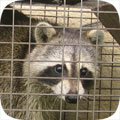 Charleston wildlife trapping - it's not as simple as it may seem. It's illegal in South Carolina to trap without a license. Trap type is very important and there are many different types, bait is somewhat relevant, trap placement
is vital, and there are dozens of small things that are very important to know.
Safety is a concern. Then once the animal is trapped, it must be removed and dealt with in the proper manner according to South Carolina law. We offer Charleston raccoon removal. Read more about how to get rid of raccoons.
Charleston wildlife trapping - it's not as simple as it may seem. It's illegal in South Carolina to trap without a license. Trap type is very important and there are many different types, bait is somewhat relevant, trap placement
is vital, and there are dozens of small things that are very important to know.
Safety is a concern. Then once the animal is trapped, it must be removed and dealt with in the proper manner according to South Carolina law. We offer Charleston raccoon removal. Read more about how to get rid of raccoons.
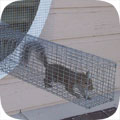 Animals in attics - this is our specialty at TruTech Wildlife Service. Many types of animals like to live in attics. This includes squirrels, raccoons, rats, mice, bats, birds, and even possums. Critters like to go into attics for a safe place to live
and raise their young. Removing animals from attics is very complex work, partly because of the presence of baby animals. If you need Charleston squirrel removal, we can remove all the squirrels from your attic, and seal out any future ones. Read more about how to get rid of squirrels.
Animals in attics - this is our specialty at TruTech Wildlife Service. Many types of animals like to live in attics. This includes squirrels, raccoons, rats, mice, bats, birds, and even possums. Critters like to go into attics for a safe place to live
and raise their young. Removing animals from attics is very complex work, partly because of the presence of baby animals. If you need Charleston squirrel removal, we can remove all the squirrels from your attic, and seal out any future ones. Read more about how to get rid of squirrels.
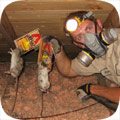 Rodent control must be done in a very specific way. First off, the most important thing is that all the openings that rats and mice can use to enter a house be sealed. Then all the rodents must be physically trapped and removed.
Never, ever use poison! Most Charleston exterminators will just use this lazy poison technique to kill rodents, and it causes more harm than good - dead stinky rats, and it doesn't solve the problem. Call us for correct Charleston rat removal. Read more about how to get rid of rats.
Rodent control must be done in a very specific way. First off, the most important thing is that all the openings that rats and mice can use to enter a house be sealed. Then all the rodents must be physically trapped and removed.
Never, ever use poison! Most Charleston exterminators will just use this lazy poison technique to kill rodents, and it causes more harm than good - dead stinky rats, and it doesn't solve the problem. Call us for correct Charleston rat removal. Read more about how to get rid of rats.
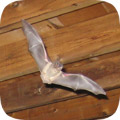 Bat removal is a highly specialized task. South Carolina is known to have colonizing bats who often live in buildings. Bats love attics. If not removed, the colony can grow to a very large size over the years. The bat droppings are often corrosive and
cause health risks. The same goes for bird droppings on or in buildings. We perform Charleston pigeon removal and bird control. But our specialty is Charleston bat removal. We remove 100% of the bat colony and seal the building so that it's totally bat-proof. Read more about how to get rid of bats.
Bat removal is a highly specialized task. South Carolina is known to have colonizing bats who often live in buildings. Bats love attics. If not removed, the colony can grow to a very large size over the years. The bat droppings are often corrosive and
cause health risks. The same goes for bird droppings on or in buildings. We perform Charleston pigeon removal and bird control. But our specialty is Charleston bat removal. We remove 100% of the bat colony and seal the building so that it's totally bat-proof. Read more about how to get rid of bats.
 If you have animals inside a house, no job is complete without proper exclusion repairs. If you simply hire a Charleston trapper who only removes the critters, then the problem will return. You need to hire a Charleston wildlife control company that identifies 100% of the animal entry points
into your building, and seals them shut with professional repairs. In addition, in many cases animals have left waste or contamination behind, and you'll want a company that can provide professional cleaning services. TruTech Wildlife Service does both.
If you have animals inside a house, no job is complete without proper exclusion repairs. If you simply hire a Charleston trapper who only removes the critters, then the problem will return. You need to hire a Charleston wildlife control company that identifies 100% of the animal entry points
into your building, and seals them shut with professional repairs. In addition, in many cases animals have left waste or contamination behind, and you'll want a company that can provide professional cleaning services. TruTech Wildlife Service does both.
The above are just some of the services offered by TruTech Wildlife Service. We also trap and remove animals that destroy lawns, such as moles, or digging animals. Sometimes animals like opossums will live under buildings, steal pet food, raid garbage cans, etc.
Read about how to get rid of opossums. Skunks commonly live under sheds or decks, and set up a den. We can trap and remove them without them spraying. Read about how to get rid of skunks. TruTech Wildlife Service
also provides dead animal removal in Charleston. If you need help with any other wildlife conflict, from a fox, beaver, groundhog, or any other critter, we can solve it. We also do Charleston snake removal - most of the snakes in South Carolina are not venomous, but
call us if you want safe removal, or read about how to get rid of snakes in Charleston. And remember, we are a private business, not Charleston County Animal Control Services, so if you have a dog or cat problem, call the County at (843) 554-4700.
Charleston County animal services does not handle any wildlife issues.
TruTech Wildlife Service: 843-325-2666
Charleston Pricing Info For Year 2022
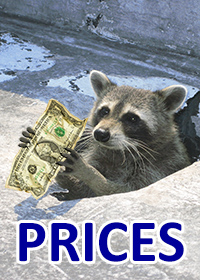 Every wildlife removal situation is different, from the species of animals involved, the location of the animal inside a house or outside, the extent of repairs or cleanup, etc. It's impossible to give one-size-fits-all prices. Examples MIGHT include:
Every wildlife removal situation is different, from the species of animals involved, the location of the animal inside a house or outside, the extent of repairs or cleanup, etc. It's impossible to give one-size-fits-all prices. Examples MIGHT include:
Small Job: For example, a one-stop job to remove an animal in the yard: $100 on up
Medium Job: For example, getting critters out of your house with minor repairs: $300 on up
Large Job: For example, a project involving many service trips and complex work: $500 on up
Give us a phone call now and tell us about your wildlife issue and we will be able to give you a price estimate over the phone. If you're cool with it, we can schedule a same-day or next-day appointment if you like. Our prices are fair, and a good value because we do the job right, the first time.
Charleston Wildlife Tip #1:
How to remove a dead rodent in the attic - Let me set the scene: you are sat in your house enjoying the Sunday morning papers, or doing laundry, or sitting in the tub and all of a sudden, you smell something that really does not smell great! What on earth was that? The smell dissipates and you go about your normal day, putting it down to something outside. The next day, you smell the same smell, but this time, it lasts for longer! What is that?! After a couple more days, the smell gets worse and worse, and it is very clear - that smell is coming from somewhere in your house! Ladies and gentleman, this could be a dead rodent living in your attic. Of course, the first step is to have a good sniff around to try and figure out where that stench is coming from - the attics and the basement are the first places that you should check out. You will often find that the insulation and other things in this area of the home means that it doesn't smell quite so bad, even though the animal has actually died there. You will have to take a few steps to sniff out the creature, and this could take a bit of practice. This is why many people tend to hire a wildlife expert - they will be much more knowledgeable. You will often find that the creature will have died in the insulation or under boards, so you should expect to do a bit of digging! Wearing gloves have a good pry around until you have found the carcass of the animal. This is not going to be a pretty side, and you will need a strong, sealable bag, or a large garbage bag that you can tie up at least. Chuck the carcass in the bag; holding your breath is going to be a good idea! If it has contaminated any of the boards or insulation around it, you are going to want to bag that up as well - otherwise you are essentially leaving the stench there. You should choose to get rid of your dead rodent in a way that is legal and final, and some people find that incinerating the creature is often the best idea to avoid attracting other rodents or problems.
Charleston Wildlife Tip #2:
Baby skunk sounds - Baby skunks make typical sounds when compared to other mammals of the same size. Their noises have been compared to those of a puppy, and a series of yelps, yaps, and squeals make up the bulk of the communication noises. Female skunks usually give birth around the month of May, and their litters are generally small. If you hear the sounds of baby animals beneath your home, you can be certain they are skunks by the pungent odor that will be left by the adult. You have to be careful when trapping and removing an adult that might have babies. If you suspect there is a litter of skunks beneath your porch or shed, contacting a professional can be a good way to handle the situation. The expert will be able to trap the adult and then remove the litter. The best way to take care of this type of situation is to prevent it altogether. Since you know skunks have litter around May, you know you have to get your yard cleaned up before that time. Make sure there is no debris out on the property. Fence in your garden; remove any pet food that might be sitting outside. If you have a deck, porch, or shed with an open space beneath the floor, you need to close that area immediately.
South Carolina Wildlife Information:
South Carolina State bird: Carolina wren, wild turkey
State mammal: White-tailed deer
State reptile: Loggerhead sea turtle
State amphibian: Spotted salamander
State fish: Striped bass
State insect: Carolina mantis
South Carolina is a coastal state, but its sandy shores extend much further inland than you might expect. Millions of years ago, the ocean coast was much different from what it is now, and the center of the state still shows evidence of ancient sand dunes from that time period. Despite the sandy soil, much of South Carolina has reverted back to forest, though the state is relatively flat except for a small patch of the Blue Ridge Mountains in the upper corner. South Carolina gets the best of both worlds-terrestrial and marine animals all in one state.
The marine animals seen by beach-goers are nothing short of amazing. South Carolina sees a number of different whale species. There are also dolphin pods, and porpoises that leap through the waves. Unfortunately, like any state along the coast, seagulls take full advantage of people on the sand, going so far as to steal food right out of people's hands. Not only do the gulls harass tourists, they create problems for local businesses and homeowners. The droppings from the birds are very corrosive.
Inland, the seagulls aren't so powerful. The animal ruling the territories in South Carolina is the alligator. Though not as densely populated as in some states, alligators are in much of the southern part of South Carolina, where the temperatures are more consistent. More widely distributed through the state are coyotes and black bears. There are also red wolves, grey wolves, and mountain lions in South Carolina.
White-tailed deer and wild hogs tend to be the most common grazers in this state. Many years ago, there were both herds of bison and of elk, but deforestation and hunting have made both species extinct to South Carolina. Any bison herds present are privately owned.
Nuisance animals live in South Carolina, just as they live in most other states. This region is ideal for pest critters like raccoons, skunks, opossums, rats, mice, and bats. Due to warmer temperature, bats can be particularly problematic because they do not need to migrate away from their roost if it is inside of a home.
South Carolina also has a number of snakes due to the warm, humid weather. Of the four venomous snakes in the United States, South Carolina has them all. There are cottonmouths, copperheads, coral snakes, and several species of rattlesnakes.
You can always call TruTech Wildlife Service, any time of day, at 843-325-2666, for a price quote for Charleston wildlife control services. I am confident that this is the best choice amongst wildlife removal companies in Charleston, SC.





































